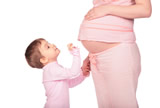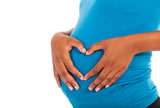Week 30 of Your Pregnancy
Week 30 of Your Pregnancy
You are now three-quarters of the way through your pregnancy and, chances are, you are feeling that the last ten weeks are stretched out forever. Believe it or not, this last part of your pregnancy will go faster than you think, as you prepare for the coming child.

Now that you're in your third trimester, approaching the finish line, you may find that you're experiencing some of the same things as you did in the first trimester. Many women at this stage of pregnancy lose that 'second wind' boost of energy that often comes in the second trimester, so you tire more easily again.
Chances are, you're also feeling the need to urinate frequently, just like when a pregnancy begins. The baby is much larger now and this puts pressure on your bladder, often making you feel an urgent need to urinate. You may even leak on occasion, especially during sudden events such as sneezing. This is perfectly normal and will go away once the baby is born.
Even the mood swings are likely back. Although hormones still play a role in the ups and downs of your moods, there are other factors coming into play, as well. You most likely aren't sleeping as well, between trying to get comfortable and having to urinate during the night. Most women start to get a little anxious about the coming baby about this point in the pregnancy, especially if it is their first child.
Now is a good time to start setting up the nursery, packing a hospital bag and making decisions about breastfeeding, circumcision and how you plan on delivering. Making these decisions and preparing for the birth can help soothe any anxieties, as well as keeping your mind occupied so it doesn't feel so much like you've been pregnant forever.
Your Baby in Week 30
At this point in your pregnancy, it's pretty obvious from your growing belly that your baby is putting on some weight. Your little one is around 16 inches long and weighs in the neighborhood of 3 pounds by now. For the next few weeks, you can expect rapid growth as the baby grows an average of ½ pound per week during much of the remainder of the pregnancy.
As the baby grows, your uterus will expand all the way up to under your rib cage and the volume of amniotic fluid will decrease as the baby takes up more and more of the room inside. The baby's organs and body systems are all present and working, so now the weight added will mainly go to fat. This fat is necessary to protect and insulate all those organs. As this fat accumulates, the baby's skin, which has been pretty wrinkled up to now, will begin to smooth out.
The baby is covered with a fine coat of hair called lanugo. Sometimes called peach fuzz, this fine hair will go away in the days and weeks after birth. Some of it begins to slough off now, as it is no longer as necessary to retain warmth now that the fat layers are building up.
Your baby's eyes are continuing to develop but can now distinguish between light and dark, and they are opening within the womb. When born, the baby's eyesight will only be about 20/400, allowing clear vision only within a few inches, and he or she will only see black and white. By about 4 months after birth, the baby will be able to see all the colors and at about 6 month, vision develops to the normal 20/20.
Your baby's brain is still developing rapidly and is now starting to acquire the dimples and grooves characteristic of an adult brain. Other systems are now functioning or beginning to, such as the digestive system which is now fully working. The baby's diaphragm now moves as the little one practices breathing. He or she can even get the hiccups now, which you may feel as it happens.
By now, you are not only feeling your little bundle of joy moving around, turning and kicking, but those touching your stomach from the outside should be able to feel it, as well. Not only is your baby making their presence felt physically, but you are likely seeing the pokes and ripples when looking at your belly.
Your Body in Week 30
Now that you're firmly in your third trimester of the pregnancy, you are probably seeing and feeling some of the less comfortable signs of pregnancy. Some of these, such as fatigue and the need for frequent urination, are just like you experienced at the beginning of the pregnancy. Others are new and can be disconcerting, especially if it's your first pregnancy.
Chances are you're feeling rather clumsy lately. There are several reasons for that, all perfectly normal to the third trimester. You are definitely heavier than you were before the pregnancy and because most of that weight is in your belly due to the growing baby, your center of gravity has shifted. This makes it harder to get up and down, especially from the bed or a deep chair.
Another cause of that clumsiness is that the hormones from pregnancy are making your ligaments and joints loosen up. This loosening is going to be needed when it comes time to deliver that beautiful baby, but in the meantime, can definitely make you feel a bit wobbly. Your feet may spread a bit while this is happening and a lot of women even find themselves going up a ½ or even full shoe size. If that happens to you, that is one change that is very likely to be permanent.
Your skin, particularly of the belly and breasts, has had to expand pretty fast over the last month or two, and it will continue to for the remaining weeks of the pregnancy. This can make the skin itchy. Many women find relief by using lotion or vitamin E gel to rub onto their bellies and anywhere it's itchy. If you're lucky, you can even get your partner to massage the lotion in, which can be very relaxing.
The stretching of the skin often leads to the bane of women everywhere – stretch marks. You are more likely to develop stretch marks if the women in your family are prone to them or if you gain more weight than is recommended. While keeping the skin hydrated well by drinking plenty of water and applying moisturizer a few times a day can help minimize the appearance of stretch marks, there is no real tried and true method of avoiding them altogether. The good news is that most stretch marks will fade over time, often becoming almost unnoticeable.
You should be feeling your baby move every day by now. Sometimes this will just be kind of a rippling sensation as the little one stretches out in his shrinking environment. Other times it may feel like there's a football player inside you, practicing his field goals. Generally, the baby will tend to be more active after you eat and a lot of women find the baby gets very active whenever they lie down for a bit.
Let's not forget your mind. You are likely back to having mood swings just like you did in the first part of your pregnancy. Hormones still play a role in these mood swings, but things like insomnia or difficulty getting a full night's sleep also contribute to the moodiness. You also may be experiencing some anxiety over the upcoming birth and the prospect of becoming a parent.
This is perfectly normal, but in about 10% of women, this can turn into true depression. If you find yourself staying in an anxious state or bad mood, or becoming more irritable and cranky as you go, it would be a good idea to discuss things with your doctor.
Week 30 Pregnancy Symptoms
As it is throughout the pregnancy, there are symptoms that most women will experience in week 30, but don't be alarmed if you don't. Every pregnancy is different, just as every woman is different. You may experience all of the following symptoms or you may only experience one or two. These symptoms won't necessarily be steady, either. You may experience a symptom only once in while or you could deal with it almost constantly.
Fatigue – As your growing baby and expanding waistline puts ever-increasing demands on your body, it's only natural that you be more tired than normal. Along with that, many women start having a hard time getting a good night's sleep at this point in the pregnancy, between their belly getting in the way and the increased need to urinate. The best thing you can do is to rest when you can and don't be afraid to ask for help when you need it.
Lightheadedness – Remember the dizziness and faintness experienced back in the first trimester? Well, it may rear its head again at this point in your pregnancy. Most of the time, this is just a result of hormones or minor changes in blood pressure. However, occasionally, this can be a sign of high blood pressure or even a condition called preeclampsia. If you also have edema in your hands or face at the same time as you experience faintness, be sure to see your doctor.
Edema – Edema simply means fluid retention, which you will see as swelling in your feet, ankles and legs. Some mild edema is normal during this part of the pregnancy so don't panic. The main cause is the excess weight and pressure the pregnancy puts on the lower part of your body. It's more likely to occur if you've been on your feet a lot or if it's a really hot day. This can generally be relieved by putting your feet up for a while and resting. As mentioned above, if the edema is in the hands or face, or is accompanied by faintness, make sure to report this to your doctor, to rule out anything serious.
Heartburn – Contrary to popular belief, experiencing heartburn during pregnancy is not a sign that the baby will have lots of hair. It's actually caused by two things. First, the growing baby and uterus is putting upward pressure on the stomach, sometimes forcing acid back into the esophagus. Second, the same hormones that loosen the ligaments and joints are also causing the muscles that separate the stomach and esophagus to relax. This allows the acid to back up into the esophagus and throat.
Constipation and Flatulence – Just as in the beginning of a pregnancy, constipation is frequently an annoyance during the last trimester, only for a different reason. As your uterus expands, there is added pressure on the bowels which can cause them to become sluggish, so things aren't moving along as regularly. Your uterus also puts added pressure on your rectum which can weaken the control over the muscles there, allowing gas to escape uncontrollably and often as a surprise.
Bleeding Gums – Pregnancy hormones can cause your gums to become inflamed, leading to swelling and sometimes bleeding. Most of the time, bleeding gums will go away after the pregnancy but you should make sure you take care of your teeth at this time.
Braxton Hicks – Your uterus has been experiencing Braxton Hicks contractions since you were about 6 weeks pregnant, but you may not have felt them before now. Most women will feel these 'practice' contractions by week 30 and it can make you nervous. Usually painless and sporadic, you may start to experience Braxton Hicks that are more regular and can become uncomfortable. Resting or changing position can sometimes relieve the discomfort.
Coming Up Next
Your breasts are getting ready to nourish your new baby, so you may start leaking a bit over the next few weeks. This leakage is the colostrum, or pre-milk, and is a yellowish, sticky fluid. At this point, a nursing bra with nursing pads will protect your clothes and eliminate possible embarrassment.
By now, most doctors will start scheduling your checkups every two weeks instead of the monthly visits from earlier in the pregnancy. Typically during the final four weeks, your checkups will be weekly. Although you may be feeling that you've been pregnant forever, it won't be long now until you are able to hold and cuddle your new baby.
Video Source: Youtube
Copyright © 2012 Babiesbase.and respective owners. All rights reserved.
Other product and company names shown may be trademarks of their respective owners.





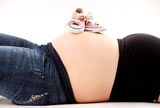
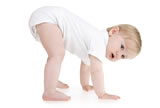


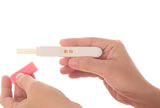

 Sign up for our week by week
Sign up for our week by week

